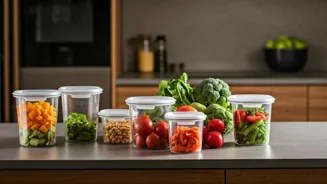Balanced Plate, Balanced You
Meal planning serves as an effective strategy for ensuring a varied and well-rounded intake. The process involves setting aside time to decide your weekly
meals, often incorporating different food groups and nutrients. This focused approach provides a framework for creating nutritious meals, which can ultimately lead to better overall health. Consider making a detailed list of meals for each day of the week. Begin by organizing your meals around the main food groups like fruits, vegetables, proteins, and whole grains. This organized method makes certain that each meal is a blend of essential nutrients, contributing to a much more balanced diet. A good meal plan also reduces the chances of missing any critical nutrients. This thoughtful strategy can set the stage for improved energy levels and enhanced health, encouraging more balanced eating habits. Implementing meal planning is a crucial tool in achieving a healthy lifestyle, ensuring that you prioritize a diet rich in diverse, essential nutrients.
Beat Unhealthy Cravings
Meal planning is an important technique in the fight against the unhealthy urge to snack. A properly designed meal plan gives you control over what you eat throughout the day, which in turn significantly lowers the likelihood of reaching for unhealthy snacks. With the meals already decided, it reduces the need to make impulsive decisions. This systematic approach ensures you make smarter food choices. If you know exactly what you’re going to eat, the chances of making hasty decisions are lower. This planning helps limit the temptation to reach for less nutritious options. Having a meal plan can help you make conscious decisions, leading to healthier eating patterns. By planning, you're less likely to be driven by impulsive cravings. This planning provides structure and guidance throughout the day. By reducing snacking, you are taking a significant step in promoting healthier eating habits.
Portion Control Power
One of the most important advantages of meal planning is the ability to accurately control portions and ingredients, thereby contributing to improved dietary habits. Preparing your meals at home allows you to measure your food precisely, something that becomes difficult when eating out. This level of control over portions helps in preventing overeating, which is a frequent contributor to weight gain and various health issues. Another advantage is your ability to select fresh and wholesome ingredients, helping you avoid preservatives, excessive salt, and artificial additives. This proactive control allows you to tailor meals to suit your personal needs, whether for managing specific dietary requirements or simply choosing healthier food choices. By creating your meals, you determine the quantity and quality of each ingredient, ensuring that your meals help your health objectives. This careful approach encourages a healthy relationship with food.
Stress-Free Mealtimes
Meal planning significantly reduces stress at mealtimes, offering a calm and organized approach to eating. The uncertainty of 'what to eat' vanishes, transforming into a clear list of pre-decided, prepared meals. This eliminates the daily struggle, reducing tension. Preparing meals also gives you a sense of control. With a plan in place, grocery shopping becomes easier and more efficient, because you only buy the things you need. Cooking can be faster because many components of the meal are ready ahead of time. By minimizing the last-minute rush, meal planning brings greater peace. It provides a structure that eases the pressures of daily meal preparation, making it a positive step for your well-being. This reduces the daily stress of planning and improves mealtime experiences.



















